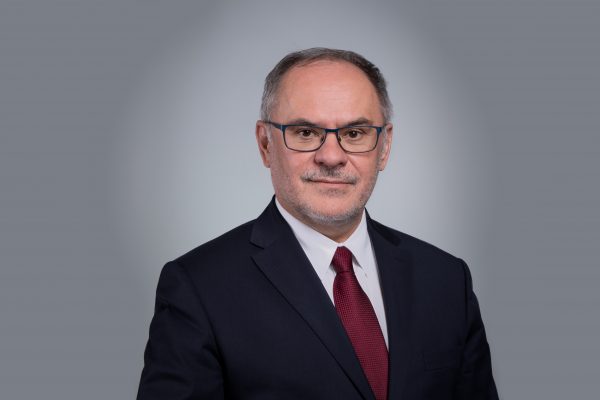Prof. Krzysztof Jarosz | Photo by University of Silesia
In January 2022, book “The Years” [Polish title “Lata”] by this year’s Nobel Prize winner in literature, Annie Ernaux was published in Poland. Prof. Krzysztof Jarosz from the Faculty of Humanities of the University of Silesia was one of the translators of this publication.
Below, the researcher describes the work of this year’s Nobel Prize-winning writer who received the award “for her courage and clinical insight with which she discovers the roots, alienation and collective limitations of personal memory”.
Annie Ernaux (born 1940) has been one of the most important French writers for at least two decades now. Popular writers such as Didier Éribon and Édouard Louis whose works are published also in Poland openly admit to being inspired by her work. This intellectual affinity is the first clue leading to the specificity of Ernaux’s work. That is because what she has encouraged these working-class gay intellectuals to do is to create in the current of the “literature of origin” initiated by her.
Of course, the story of social advancement is slightly different for each of them. Their story, however, is linked by a kind of mental suspension between the milieu of simple people from which they came out and the world of intellectual elites, which in France bears clear signs of bourgeoisie. Perhaps this description of the transition from one social group to another turned out to be incongruous with the extremely awakened aspirations of Polish society at the turn of the 1980s and 1990s – the book “The man’s place” [Polish title “Miejsce”] by Ernaux, published in 1989 in Poland, translated by Iwona Badowska, was practically unnoticed (the book is referred to as a micro-novel, but in reality it is a biography of a father as seen through his daughter’s eyes).
Meanwhile, Ernaux’s literary career in her native country, and then also in other Western countries, flourished. Today, the writer’s bibliography consists of over twenty books. Sometimes they are called novels (this is what Ernaux herself described her first three works as), but everything she wrote is more or less non-fictional and autobiographical. That being said, her works combine the archeology of her own past with the sociological image of the past years. The result is an Ernaux-typical blend of what might be called auto-socio-graphy.
This is best seen in the book “The Years”, published in Poland at the beginning of the year, in which Ernaux recreates the history of her life, successive stages of consciousness against the background of post-war changes in France from 1945/1946 to 2006. In this way, we get a picture of six decades of a woman’s life: a girl, a teenager, a student, a young married woman, a mother, a divorced woman, a mature woman more and more independent and aware of her freedom, finally, an older and then very old lady, a grandmother; at the same time a teacher, an active citizen involved in politics, writer, intellectual who takes a voice in the public debate and stands in it on the side of her leftwing ideals, which in itself shows the path she has traveled since childhood and early youth, when she was overwhelmingly influenced by the strict control of a mother of highly religious conservative views.
“The Years” is also a work about passing. The first and last sentences speak of the inevitable passing (all images will disappear) and the desire to record on paper the life of hers and her contemporaries in an exceptionally long period of time. Here, Proust is a model for Ernaux, although the way of recording memories alone cannot, nine decades after “In Search of Lost Time”, formally and stylistically refer to the shifting in time of Marcel’s existence – the fin de siècle narrator-hero of the fictional sum of his great predecessor.
Last but not least, it is impossible not to mention what is perhaps the most important in Annie Ernaux’s writing. Ernaux describes the story of her life (which is understandable), but also the story of more or less wide circles of French society from the female point of view. This autobiography, often written in third person (“The Years” is written in third person in its entirety), is a herstory, a story about the birth of a woman’s consciousness, an extremely (surgically, clinically – according to the verdict of the Nobel Prize Committee) sincere confession and reflection on oneself, that does not avoid the most embarrassing fragments of its own biography, such as a semi-forced and traumatic sexual initiation (as described in “Mémoire de fille”, 2018), or illegal termination of an unwanted pregnancy when the author was 23 years old.
On the basis of Ernaux’s short piece about this experience (“L’événement”), French director Audrey Diwan made a film “Happening” (Polish premiere soon), which was awarded last year at the Venice Film Festival. I must admit that I learned about its existence from my student writing a thesis about Ernaux.
This student became interested in the work of the Nobel Prize winner because of the topicality of the abortion issue, which touches the generation of today’s young Polish women extremely severely. This unforseen influence, in turn, made me aware of the timeliness of Ernaux’s work in Poland.
I am convinced that the publication of Polish translations of her subsequent books will find many Polish women, but also many Polish people in genral who discover the dramatic and absurd timelessness of her reflection on the female condition at the beginning of the third decade of the 21st century and in the heart of Europe.






